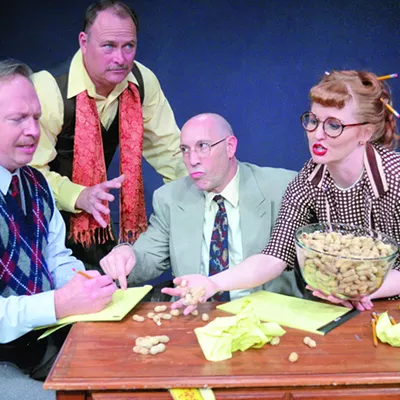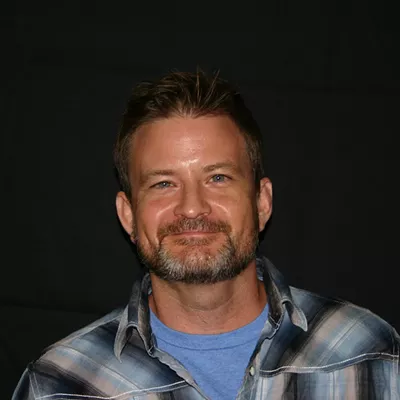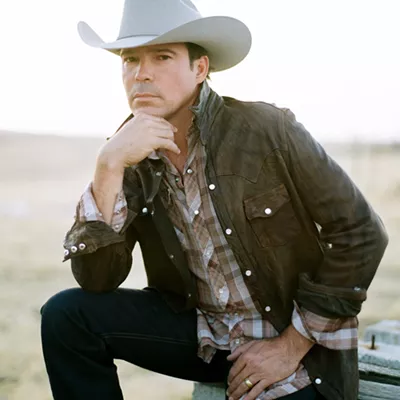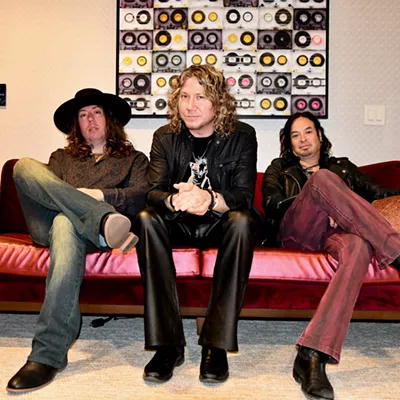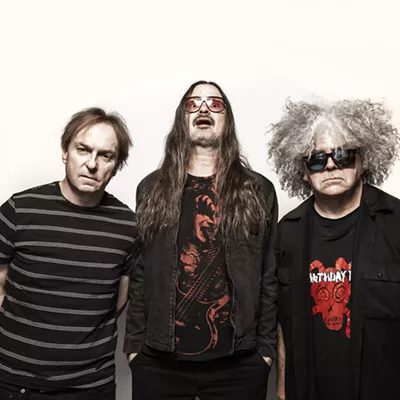"Mercury in Retrograde," the opening track on Brian Lopez' new "Static Noise," is at once a universal story and a microcosm, a model of both creation and evolution. Its sonic space-field opening, and the art and science of its composition, introduce a collection of songs representing a surge of creative motion over a particularly energy-charged time and space.
But its origin story couldn't be more humble. "Actually the way this started was I just thought it would be cool to have a song called 'Mercury in Retrograde,'" said Lopez. "Phonetically I just liked it." He spoke expansively, unguarded and relaxed at a table in the center of the Armory Park home he shared at the time with Gabriel Sullivan, guitarist, producer and partner in the wildly popular psychedelic Latin dance band Chicha Dust. "When I started reading up on it I found there was tons of stuff to write about ... You're supposed to be able to correct things that happened in the past. "
From such whimsical beginnings, the song leads into 13 tracks of fresh perspective on Lopez, his music and his career prospects, reflecting the maturity earned and the influences absorbed in hundreds of hours on tour domestically and internationally with Howe Gelb's Giant Giant Sand, solo opening slots for Scottish singer-songwriter K.T. Tunstall, dozens of hours in the studio as guitarist on-call for other recording artists, and a soupcon of style points from Sean Slade, whose credits include Radiohead, Pixies, Hole, Ben Folds and Morphine.
Lopez's last set of original music was "Ultra," his first album following the breakup of his just-post-college band Mostly Bears. A too-short-lived, cutting edge, psychedelic/prog outfit, Mostly Bears had swept Tucson like a flash flood, leaving a TAMMIES® award and hundreds of bereft fans in its wake.
'"Ultra' was a result of me scrambling as to what I'm going to do next," Lopez said. "I've always had songs. I have melodies and lyrics going through my head pretty much all the time. With Mostly Bears, there'd be songs they didn't want to do because it wasn't a band thing. I just slowly started compiling a catalog of songs that I was doing on my own."
"The difference was that all of a sudden you heard his voice," said longtime manager and sometime employer Mike Lembo of Funzalo Records and Mike's Management. "You never heard his voice with Mostly Bears. All of a sudden ... there's an angel in that body. There's a voice!"
Lopez acknowledges the deficit. "You should hear the early Mostly Bears demos. It's fuckin' terrible. I listen to them and it's just like ... I am just yelling as loud as I can until my voice cracks."
With "Ultra," the crystal tone, soaring falsetto and expansive emotional range of his voice began living up to the comparisons in his bio: Jeff Buckley and Radiohead's Thom Yorke hardly seemed a stretch.
Highlights were the indelible and brooding "Pray for Rain" and the crowd-pleasing "Killing Moon." There were also two songs—"Montjuic" and "Leda Atomica," from what one might call a Castillian trilogy, of which the first, "Passeig de Grácia," had appeared on Mostly Bears' live album, "Teams of Spirits."
The three songs were inspired by what, to that point, had been Lopez' most formative life experience: a six-month study-abroad program in Barcelona. "I think without that Barcelona trip my life would be completely different," Lopez said, "because you have to think, I grew up downtown, went to Roskruge and Tucson High, the U of A (on a guitar scholarship), all within a mile of each other. So at age 21 it was like 'All right. Let's get out of here'."
The UA had just opened the program and it offered two classes Lopez needed for his business minor. The city's medieval Catalonian charm and seaside romanticism soon overthrew the budding businessman for the burgeoning artist. "I ended up pretty much taking Spanish and art. I had one world economic course and I didn't realize it at the time but it was in Castellano (the Spanish dialect most familiar to U.S. students of the language.' And I thought 'What the fuck?' I was in there taking notes the first day and I thought 'Yeah, I'm gonna have to drop this class.'"
Immersion in the highlights of the great international city's art and culture ensued, inspiring a song about its dominant geological feature, the high, broad hill called Monjuic, which hosts, along with its ruined fortresses and spectacular public structures, a museum dedicated to modernist painter and sculptor Joan Miró.
Surrealist Salvador Dali's painting "Leda Atomica" is the subject of Lopez' song by that name, which, although it first appeared on Mostly Bears' "Ed Mitchell Clinic," was one of just two songs Lopez reprised on "Ultra" from his Mostly Bears era. The other was the equally egghead-y "Maslow's Hierarchy."
"Ultra" was something of a mixed bag. "I like it," Lopez said. "I listen back to it. I'm still proud of it, but it's just so far from where I am, now."
At a point during Mercury's sojourn in retrograde, it appears to slow down and reverse itself, as if retracing its cosmic steps to some past point and starting over. In hindsight, the disintegration of Mostly Bears and the launch of his solo career delivered Lopez to just such a point—slowed down, and open to the kind of schooling that only studio and touring experience could provide. His growing self-knowledge had also prepared him for the rare sort of apprenticeship that intensive work with Howe Gelb could provide.
He essentially started over, on the path from the promising "Ultra" to the accomplished, fully realized "Static Noise."



